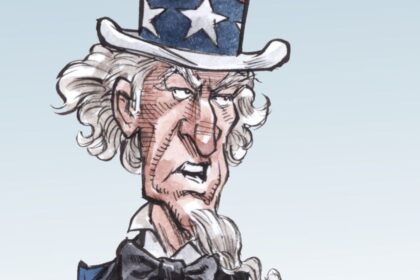Politics·ExclusiveThe Carney government’s budget legislation contains an amendment that lawyers representing veterans say is a bid to cover up a decades-long error that led to overcharging for long-term care. ‘I’ve never seen anything like this,’ says lawyer representing veteransKate McKenna · CBC News · Posted: Nov 20, 2025 4:00 AM EST | Last Updated: 29 minutes agoListen to this articleEstimated 4 minutesThe audio version of this article is generated by text-to-speech, a technology based on artificial intelligence.A CBC News analysis found that last year alone, veterans may have been overcharged by about $3,130 for long-term care. (Spencer Colby/The Canadian Press)The Carney government’s budget legislation contains an amendment that lawyers representing veterans say is a bid to cover up a decades-long error that led to overcharging for long-term care.“Instead of owning up to their error, they are trying to change the rules after the fact,” said Malcolm Ruby, partner at Gowling WLG and co-counsel in a proposed class-action lawsuit seeking damages for an estimated tens of thousands of veterans.“Retroactively changing legislation is like a thermonuclear weapon that the government has in litigation, that no other litigant has.”The proposed amendment is buried in the 637-page budget implementation act, tabled on Tuesday.It seeks to “clarify” the formula used for how much veterans should pay for long-term care, and apply that formula retroactively — a move being interpreted by the lawyers in the proposed class action as a way to legalize an expensive federal error.In October 2024, CBC News reported that the federal government likely made an error interpreting its own law, causing the Veterans Affairs Department to miscalculate what veterans should pay. Sources with ties to the department had said the issue was known internally and never addressed.With some exceptions, veterans in the department’s long-term care program are required to cover only the cost of their accommodation and meals. That cost is supposed to be set at a level equal to the lowest cost of room and board in the least expensive province, with federal law defining “province” to include territories. However, an analysis by CBC News showed that Veterans Affairs was excluding territories from its calculation — even though the Northwest Territories has long had the cheapest rate for long-term care.The analysis showed that last year alone, veterans may have been overcharged by about $3,130.The revelations prompted Ruby and his co-counsel, retired colonel Michel Drapeau, to launch the class action. They allege the overcharging has been happening since at least 1998. “They should have been applying a formula that was based on territorial expense. Instead, they neglected that,” said Ruby. “That resulted in overcharges and they were fairly significant overcharges for individual veterans.”A day after the CBC News report, Prime Minister Justin Trudeau told the House of Commons that officials were investigating the matter further.‘They’re trying to shut down veterans’But the Carney government’s proposed amendment to the Veterans Health Care Regulations seeks to retroactively define “province” as excluding the territories — which could have the effect of eliminating the obligation to reimburse veterans who overpaid. It would also effectively end the class action ahead of its certification hearing in 2026. “They’re trying to shut down veterans and their lawyers who are making them accountable for their errors,” said Ruby. Finance Minister François-Philippe Champagne dismissed a question on why the government seeks to amend the law.“What I can say is that when it comes to services, actually we added money to support veterans, recognizing the service they’ve done to our nation,” he said on Wednesday. A spokesperson for Champagne said the amendments “clarify” existing methodology used to calculate benefits, and that the government is entitled to make such changes.“While there is a general presumption that legislation only applies to future events, this presumption can be displaced if there is clear legislative intent for the law to apply to past events,” said the spokesperson, John Fragos, in a statement.But Drapeau, who served in the Canadian Armed Forces for more than 30 years, disagrees with the idea that it’s acceptable to retroactively change a legal definition that affects how benefits are calculated. “I’ve never seen anything like this,” said Drapeau. “This is not law. This is fiction.”The bill will have to pass through Parliament in order to take effect.ABOUT THE AUTHORKate McKenna is a senior reporter with CBC’s parliamentary bureau in Ottawa, where she covers federal politics. She previously worked for CBC’s The Fifth Estate and in the Halifax, Montreal and Charlottetown newsrooms. Her investigative and breaking news coverage has won five RTDNA awards. She is the author of No Choice: The 30-Year Fight for Abortion on Prince Edward Island.
Wednesday, 4 Mar 2026
Canada – The Illusion
Search
Have an existing account?
Sign In
© 2022 Foxiz News Network. Ruby Design Company. All Rights Reserved.
You May also Like
- More News:
- history
- Standing Bear Network
- John Gonzalez
- ᐊᔭᐦᑊ ayahp — It happened
- Creation
- Beneath the Water
- Olympic gold medal
- Jim Thorpe
- type O blood
- the bringer of life
- Raven
- Wás’agi
- NoiseCat
- 'Sugarcane'
- The rivers still sing
- ᑲᓂᐸᐏᐟ ᒪᐢᑿ
- ᐅᑳᐤ okâw — We remember
- ᐊᓂᓈᐯᐃᐧᐣ aninâpêwin — Truth
- This is what it means to be human.
- Nokoma











